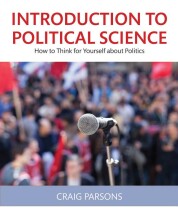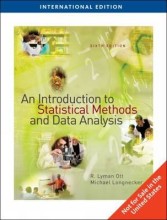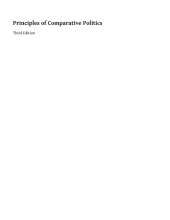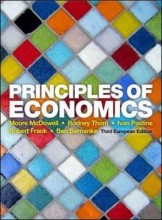Summary: Introduction To Political Science | 9780134319193 | Craig Parsons
- This + 400k other summaries
- A unique study and practice tool
- Never study anything twice again
- Get the grades you hope for
- 100% sure, 100% understanding
Read the summary and the most important questions on Introduction to Political Science | 9780134319193 | Craig Parsons
-
1 Introduction
-
1.2.1 Why Escaping Politics Is a Dead End
This is a preview. There are 1 more flashcards available for chapter 1.2.1
Show more cards here -
Some people try to escape politics. This kind of liberated life is sometimes called 'state of nature'. Define this term.
An imagined time prior to the development of society or politics. -
Attempts to "escape" collective decision making tend to lead to two kinds of bad outcomes, namely"
- Other people become even more dominant because you have left the field to them.
- Things just fall apart and the benefits of interacting begin to disappear. -
1.3 From Politics to Political Ideologies and Political Science
-
To reclaim politics, you must become a critical thinker. This is someone who:
Can understand, criticize and defend certain views about the political world against others. The foundation of all independent, critical thinking is the ability to imagine alternative points of view. -
The study of politics helps you become a critical thinker by imagining political alternatives from the following three angels:
- Political description (the task of grasping how political life and action are organized).
- Political philosophy (the project of evaluating the good and bad in politics, addressing both how politics works and how it should work).
- Political Science (the systematic effort to explain why politics works as it does). -
1.4 Three Explanatory Approaches in Political Science
-
What are the three explanatory approaches to explaining political action in political science?
- Rational Material Explanation
- Institutional Explanation
- IdeationalExplanation -
A forth explanatory approach in individual-level political choices, is psychology. However, this makes it not plausible to answer cross-groups questions. But what is its core hypothesis?
People have certain genetic, hard-wired personalities and dispositions. -
1.4.1 Alternative 1 - Rational-Material Explanation: A Clash of Interests
-
What is the core hypothesis of the rationalist-Materialist Explanatory approach?
People choose the most advantageous actions given their position in the material landscape. -
1.4.2 Alternative 2 - Institutional Explanation: Playing by the Rules of the Game
-
Human-made rules and structures build to guide their interactions are also called:
Institutions -
What is the core hypothesis of the Institutionalist Explanatory approach?
People choose the most advantageous actions given their position in an obstacle course of organizations and rules. -
1.4.3 Alternative 3 - Ideational Explanation: Beliefs and 'Culture Wars'
-
What is the core hypothesis of the Ideational Explanatory Approach?
People act in accordance with beliefs about how the world works and what is right. (In contrast to both rational-materialist and institutional stories, it suggests that not everyone sees the same situations in the same ways).
- Higher grades + faster learning
- Never study anything twice
- 100% sure, 100% understanding
Topics related to Summary: Introduction To Political Science
-
Introduction - Alternative Methods to Test and Support Explanations
-
Ideologies - Wat is (and isn't) ideology? - What are you expected to think? Public opinion and political culture
-
Ideologies - The liberal tradition - Classical liberalism and modern liberalism
-
Ideologies - The liberal tradition - Modern conservatism and its variants
-
Ideologies - Older alternatives to the liberal tradition: Socialism and Fascism - Socialism and its variants
-
States - Organizing a word of states: definition and origins of state sovereignty
-
States - Variations among nation-states
-
States - New challenges to the nation-state model
-
Governments - Governments, Authority and Power
-
Governments - Liberal democracies - Representation of the people
-
Inside Liberal Democracy I: Representation - Voting rules: how citizens choose
-
Inside Liberal Democracy I: Representation - Political parties: intermediaries of representation
-
Economic development and growth - Basics of market-based growth
-
Political Violence: War and Terrorism - The rise (and fall?) of major war - War in the bipolar era: globally cold, locally hot































